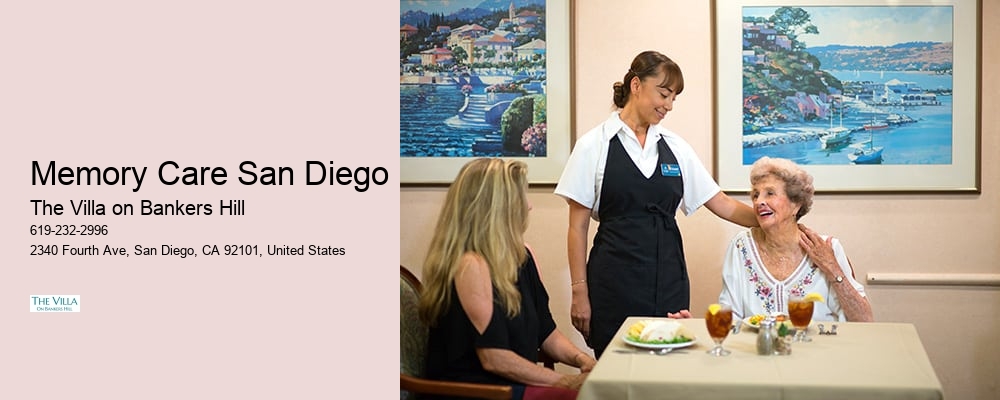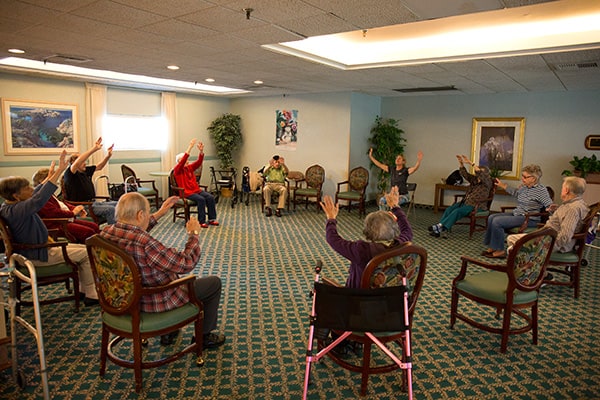

Recently awarded the title of Top San Diego Assisted Living Community by the San Diego Union-Tribune, The Villa on Bankers Hill is a lovely assisted living and memory care community located just two blocks from Balboa Park. We offer a variety of services, including diabetic care, medication management, and assistance with personal care. Families enjoy our home-like setting, featuring private apartments, 24-hour nursing, and a secure memory care area.

The Villa on Bankers Hill stands out for its tailored approach to assisted living and memory care. Recognizing that every individual's needs are unique, the facility offers personalized care plans. This means residents receive the support they need while maintaining as much independence as possible. The skilled staff is trained to handle a range of needs, from assistance with daily activities to specialized memory care for those with Alzheimer’s or other forms of dementia.
Comfort is key at The Villa on Bankers Hill, which boasts premium amenities designed to make residents feel right at home. From cozy common areas for socializing to private rooms equipped with modern conveniences, there's an emphasis on creating a warm and inviting atmosphere. Residents can enjoy beautifully landscaped gardens, participate in fitness programs, or engage in stimulating activities—all within the safety of the community.
Memory care is a cornerstone of The Villa on Bankers Hill’s services. The facility employs cutting-edge programs and therapies that are specifically designed to help residents with memory impairment. These strategies aim not only to slow the progression of such conditions but also enhance quality of life by fostering moments of joy and connection every day.
Understanding the importance of nutrition and wellness in aging, The Villa on Bankers Hill provides meals that are both delicious and nutritious. Each dish is prepared with fresh ingredients by professional chefs who understand dietary restrictions and preferences. Alongside physical nourishment, there is also an emphasis on wellness programs that promote mental health and emotional well-being.
Safety is paramount at any assisted living or memory care facility, and The Villa on Bankers Hill places resident security at the forefront. With state-of-the-art security systems in place, families can rest assured their loved ones are safe at all times. Furthermore, highly trained staff are always available around-the-clock to respond to any emergencies or assist with resident needs.
Lastly, residing at The Villa does not mean isolation from the broader community; rather it encourages connection. Located in vibrant Bankers Hill, residents have access to local attractions and events which fosters engagement beyond the walls of the facility itself. Regularly scheduled outings ensure that those calling The Villa home retain a sense of belonging within their wider community while receiving top-notch care.
| Facility Name | Description |
|---|---|
| Greenfield Senior Living | Provides compassionate memory care with a focus on individual needs. |
| The Arbors Memory Care | Offers a comfortable and secure environment for residents with memory loss. |
| Oakmont Memory Care | Dedicated memory care programs that enhance the quality of life for residents. |
| Seasons Memory Care | Provides specialized care for individuals experiencing memory loss and cognitive decline. |
| Synergy HomeCare Memory Care | Offers in-home memory care services tailored to individual needs. |
Meet Janet Blair" width="853">

Medication management is a critical component of care in assisted living facilities, especially those specializing in memory care. As residents often have complex medication regimens for various chronic conditions, dementia, or Alzheimer's disease, ensuring they receive the right medications at the right time is paramount. Proper medication management can significantly improve the quality of life for individuals with cognitive impairments by stabilizing symptoms and preventing drug interactions that could exacerbate their condition.
In memory care facilities, each resident typically receives a personalized care plan that includes detailed medication instructions. These tailored plans are developed in collaboration with healthcare providers, pharmacists, and the facility's nursing staff to accommodate individual health needs and preferences. The goal is to administer medications in a way that supports residents' cognitive function while minimizing potential side effects and maintaining overall well-being.
Assisted living facilities employ trained professionals who are skilled at managing complex medication schedules. Nurses or certified medication aides handle the administration of drugs, ensuring that each resident takes their medication as prescribed. Their expertise also allows them to observe and document any adverse reactions or improvements in residents' conditions, providing valuable feedback to physicians who may need to adjust dosages or prescriptions accordingly.
To enhance accuracy and efficiency in medication delivery, many assisted living communities integrate technology into their management systems. Automated dispensing machines, electronic medical records (EMRs), and computerized physician order entry (CPOE) systems help staff track prescriptions, manage refills promptly, and avoid errors related to manual handling of medications. Such technologies also facilitate communication between various caregivers involved in a resident's treatment plan.
Education plays a crucial role in effective medication management within memory care facilities. Staff members not only assist residents with taking their medications but also provide education about the purpose and potential side effects of each drug they are prescribed. Family members are often included in this educational process so they can understand how certain medications impact their loved one's health and behavior.
Continuous monitoring is an integral part of managing medications for residents with cognitive challenges. Assisted living staff work closely with healthcare providers to monitor each resident’s response to medications over time. Regular assessments allow adjustments to be made as needed when it comes to dosages or even discontinuing certain medicines which no longer serve their intended purpose or may be causing harmful side effects.
Consider factors like location, staff qualifications, available services, community atmosphere, and cost when choosing a facility.
Activities often include art therapy, music therapy, exercise programs, and social events designed to engage residents and stimulate their minds.
Services typically include assistance with daily living activities, medication management, and specialized memory care programs.
The staff-to-resident ratio varies by facility but is generally higher in memory care to ensure adequate attention and support.
Many facilities coordinate with healthcare providers to offer specialized medical care tailored to the residents� needs.
Yes, most memory care facilities provide three meals a day, tailored to meet the dietary needs of residents.
Staff typically receive training in dementia care and may hold certifications in memory care or related fields.